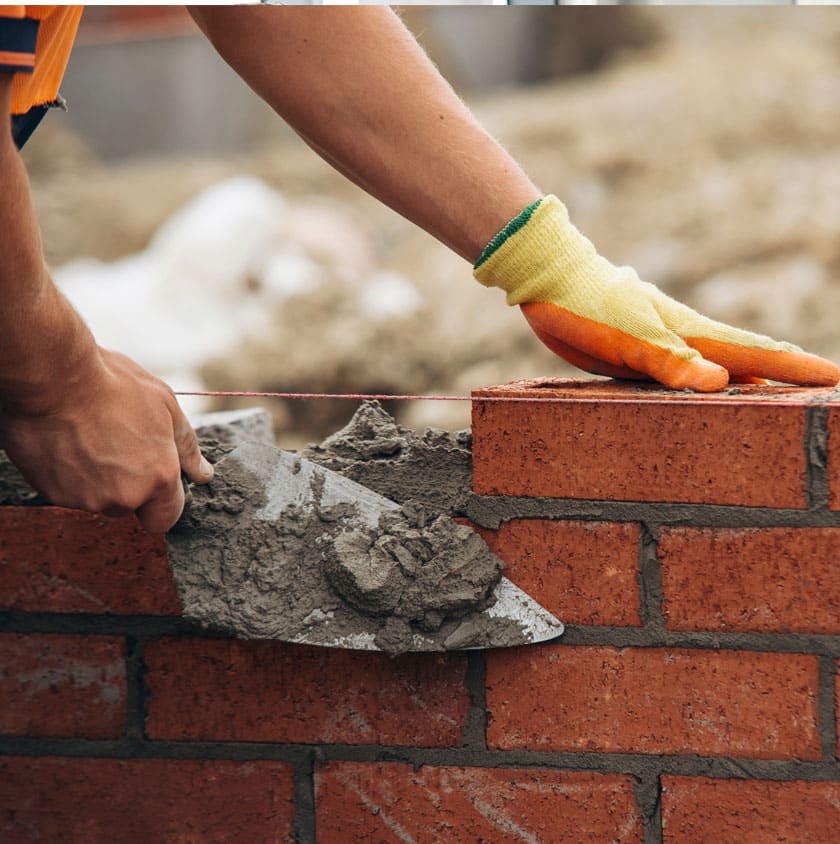
Bricklayers Insurance
Compare Bricklayer Insurance Quotes
- Complete one short form
- Quickly compare quotes
- Find a great deal today!

Compare insurance quotes from UK’s leading bricklayer insurers including:
Why Compare Bricklayer Insurance Quotes At SimplyQuote.co.uk?
Comparing bricklayer insurance helps you find the right cover for the work you actually do — without overpaying or risking gaps that could cost you later.
At SimplyQuote, we’ve partnered with Quotezone to bring you tailored tradesman insurance quotes from a trusted panel of UK insurers. You fill in your details once, and we do the legwork — matching you with policies designed specifically for trades like bricklaying.
Every job site is different. Whether you’re laying foundations, building extensions, or working at height, the risks vary — and so should your cover. Comparing lets you choose the right public liability limit, add optional extras like tool cover or personal accident insurance, and make sure you’re legally compliant if you hire help.
No pushy calls. No hassle. Just fast, trade-relevant insurance you can sort out in minutes.
What Do I Need to Get a Quote?
To get a quote for bricklayer insurance, you’ll need to give a few key details about your work, your business setup, and what level of cover you want.
It’s a quick process — usually done in under five minutes. You’ll be asked to confirm:
- What kind of bricklaying work you do — Domestic, commercial, site-based, extensions, walls, structural blockwork, etc.
- Your business type — Sole trader, limited company, or whether you use subcontractors or labourers
- Annual turnover — Helps insurers gauge your exposure to risk
- Where you operate — Your postcode and job locations can affect the premium
- If you use tools and need tool cover — You’ll be asked about total tool value and where you store them
- If you work at height — Working on scaffolding or multi-storey builds may need to be declared
- Your public liability limit — Typically £1M, £2M, £5M or £10M
- Optional extras — Like personal accident cover, employer’s liability, or legal expenses
- Claims history — Recent insurance claims can affect your price
The more accurate your answers, the better your quote. It’s designed to match real-world bricklaying jobs — so the process is quick, relevant, and pain-free.
Why Do I Need Bricklayer Insurance Cover?
Bricklayer insurance protects you financially if something goes wrong — like property damage, injuries on-site, or claims made against your business.
It also helps you meet legal and contract requirements if you work with others.
Accidents happen fast on site. A mislaid trowel, a loose brick, or even a cement spill can result in damage, injury, or a legal claim. Without insurance, you’d be responsible for any costs — including compensation, legal fees, or replacement materials.
Public liability insurance helps cover you if a member of the public is injured or if you damage property during a job. If you use tools every day, tool cover ensures you’re not left stranded after a theft or accidental damage. And if you rely on your income to stay afloat, personal accident cover can offer vital protection if you get injured and can’t work.
And perhaps most importantly — many contractors and site managers won’t even let you start a job without proof of cover.

What Insurance Do Self-Employed Bricklayers Need?
Self-employed bricklayers typically need public liability insurance as a baseline — with tool cover and personal accident insurance also being common.
You may work alone, but you’re still responsible for injuries, damage, or accidents on-site.
Here’s what most self-employed bricklayers include in their policy:
- Public liability – Covers claims if you damage a customer’s property or someone is injured due to your work. Whether it’s a falling brick or a cement bag in the wrong place, this is your frontline defence.
- Tool cover – Your tools are your livelihood. If they’re stolen from your van or damaged on-site, this helps you replace them fast.
- Personal accident insurance – If you’re injured and can’t work, this can help cover income loss while you recover. No sick pay when you’re self-employed.
- Employer’s liability – Not required if you genuinely work solo. But if you occasionally bring in a labourer or subcontractor, even short-term, this could become legally necessary.
Being self-employed means the buck stops with you. The right cover helps you avoid financial setbacks — and sends a message to clients that you take your business seriously.
Does Bricklayer Insurance Cover Subcontractors Or Hired Help?
Bricklayer insurance doesn’t automatically cover subcontractors or hired help — and if you don’t declare them, your policy might not pay out if there’s an accident or claim.
The type of worker and how they operate makes a difference.
Labour-only subcontractors
If you bring someone in who follows your instructions, uses your tools, or works under your direction, they’re classed as a labour-only subcontractor — and legally, you’ll need employer’s liability insurance to cover them.
Bona fide subcontractors
These are individuals or companies who work independently, bring their own tools, and carry their own insurance. You’re generally not liable for their actions, but some insurers may still expect you to confirm they’re covered.
Casual help
Even a mate helping for a couple of days could be considered labour-only in the eyes of your insurer. If they’re injured or cause damage and you don’t have the right cover, it could leave you personally responsible.
If your setup changes — even temporarily — update your insurer. The cost of getting caught out is almost always worse than the cost of doing it properly.
What Does Bricklayer Insurance Cover Include?
Bricklayer insurance typically includes public liability, tool cover, personal accident protection, and employer’s liability if you hire others.
You can also tailor your policy with optional extras depending on the type of work you take on.
Here’s what’s usually included:
- Public liability insurance – Covers you if someone is injured or property is damaged because of your work. If a brick falls from a scaffold or cement ruins a driveway, this helps with compensation and legal costs.
- Tool cover – Protects your essential gear from theft or accidental damage. Mixers, lasers, trowels, levels — if you depend on it, you can insure it.
- Employer’s liability insurance – Required by law if you bring in labourers or subcontractors who work under your direction. Covers claims from workers injured on the job.
- Personal accident insurance – If you get injured and can’t work, this pays out. No income protection as a self-employed worker makes this one worth considering.
- Legal expenses cover – Helps with legal costs if a dispute arises — whether it’s a tax investigation, client disagreement, or defending yourself against a claim not covered by liability.
Some bricklayers also add contract works insurance, especially if they’re working on larger or unfinished projects that could be delayed or damaged by events outside their control.

What’s Not Included?
Bricklayer insurance won’t cover everything — and knowing what’s excluded can save you a major headache if something goes wrong.
Policies vary slightly, but here are the most common exclusions to watch for:
- Tool wear and tear – You’re covered for theft or accidental damage, not for old or broken tools that wear out over time.
- Unsecured tools or vans – If your gear is left in an unlocked vehicle or on a site without proper security, your tool cover may be void.
- Undeclared subcontractors or labourers – If you take someone on to help but haven’t declared them, your employer’s liability may not cover injuries or claims.
- Work outside your declared trade – If your policy is for bricklaying but you also take on roofing, rendering, or groundwork without disclosing it, you may not be covered.
- Poor workmanship – If the client claims you didn’t do a good job, insurance won’t pay to fix or redo the work — that’s not what liability cover is for.
- Illegal or unsafe practices – Failing to follow health and safety rules, using banned materials, or working without proper training can all invalidate your cover.
Reading the fine print matters. It’s not about catching you out — it’s about making sure your cover reflects the work you actually do.
How Much Does Bricklayer Insurance Cost?
Bricklayer insurance typically starts from around £70 to £150 per year for sole traders — but the actual cost depends on your work type, risk profile, and the level of cover you choose.
If you’re a self-employed bricklayer doing standard domestic work, you could pay as little as £6–£12 per month. But costs rise if you:
- Work at height or on scaffolding
- Operate on large-scale or commercial sites
- Use expensive tools (and need full tool cover)
- Hire subcontractors or labourers
- Have made past claims
- Require a higher public liability limit — £2M or £5M
Your postcode also matters. Working in high-risk or theft-prone areas can push your premiums up, especially if tool cover is included.
The cheapest option isn’t always the best. A stripped-back policy may leave you exposed when it counts. Smart tradespeople get quotes, compare what’s covered, and choose a policy that matches how they actually work.
How Can I Save Money On Bricklayer Insurance?
You can save money on bricklayer insurance by tailoring your policy to your actual work, reviewing it annually, and avoiding cover you don’t need.
Here’s what helps bring your premium down:
Pick the right public liability level
If you’re not working on commercial sites, £1M or £2M might be enough. No need to pay extra for £5M unless it’s contractually required.
Don’t over-insure your tools
Be accurate about what you use and what it’s worth. Insuring gear you don’t actually carry adds cost.
Store your tools securely
Insurers will often charge more if you leave tools in unlocked vans or on exposed sites.
Compare quotes yearly
Insurers adjust rates all the time. A quick yearly check often reveals cheaper, better-suited options.
Increase your voluntary excess
If you’re low risk and rarely claim, this is an easy way to trim your premium.
Maintain a clean claims record
Paying out of pocket for smaller incidents can help protect your long-term pricing.
Insurance isn’t a tax — it’s protection. The key is to get the right protection at the right price, not just the cheapest deal.
How To Compare Bricklayer Insurance Quotes Online
Comparing bricklayer insurance at simplyquote.co.uk is quick, straightforward, and designed around the needs of trades like yours.
You fill in one form, and we connect you with tailored quotes from trusted UK insurers.
Here’s how it works:
- Tell us what you do
Select “Bricklayer” as your trade, and give basic details like your postcode, annual turnover, and whether you work solo or use subcontractors. - Choose your cover levels
Pick your public liability limit — usually £1M, £2M or £5M — and add extras like tool cover, personal accident, or employer’s liability if needed. - See live quotes instantly
Get matched with insurers that specialise in trade policies. No pushy sales calls, no hidden charges — just fast, relevant comparisons. - Check what’s included
Don’t just look at price. Check exclusions, excess amounts, and make sure the policy reflects how you actually work. - Buy direct from the provider
Once you’ve chosen a quote, you’ll go straight to the insurer to complete your purchase. It’s fast, secure, and powered by our partnership with Quotezone.
When your tools are clean and the cement’s mixed, you don’t want to waste time on paperwork. Comparing here makes it simple — so you can get back to building.
Frequently Asked Questions
Only employer’s liability insurance is a legal requirement — and only if you hire staff or labour-only subcontractors. Public liability isn’t required by law, but most clients and contractors expect it.
Yes — but you’ll need to declare all the work types you carry out. If you don’t, you may not be covered if something goes wrong outside your declared trade.
No. Insurance won’t cover faulty workmanship or claims arising from poor structural work unless you also hold professional indemnity insurance — which most bricklayers don’t.
Yes. You’ll need to estimate your annual turnover, but working part-time or seasonally won’t stop you getting cover.
Yes. Even domestic jobs carry risks — like property damage or personal injury. Without insurance, you’d be liable for any claims out of your own pocket.
Only if you’ve added tool cover and your van meets the insurer’s security requirements — like being locked and parked in a secure location.
Usually, yes — but you’ll need to declare if you work at significant height or use scaffolding regularly. Always check your policy includes it.
Yes. Many insurers offer monthly payment plans — although you may pay slightly more overall than if you pay annually.
Written by Chris Richards
Page last reviewed on 26th March 2025 by Chris Richards
